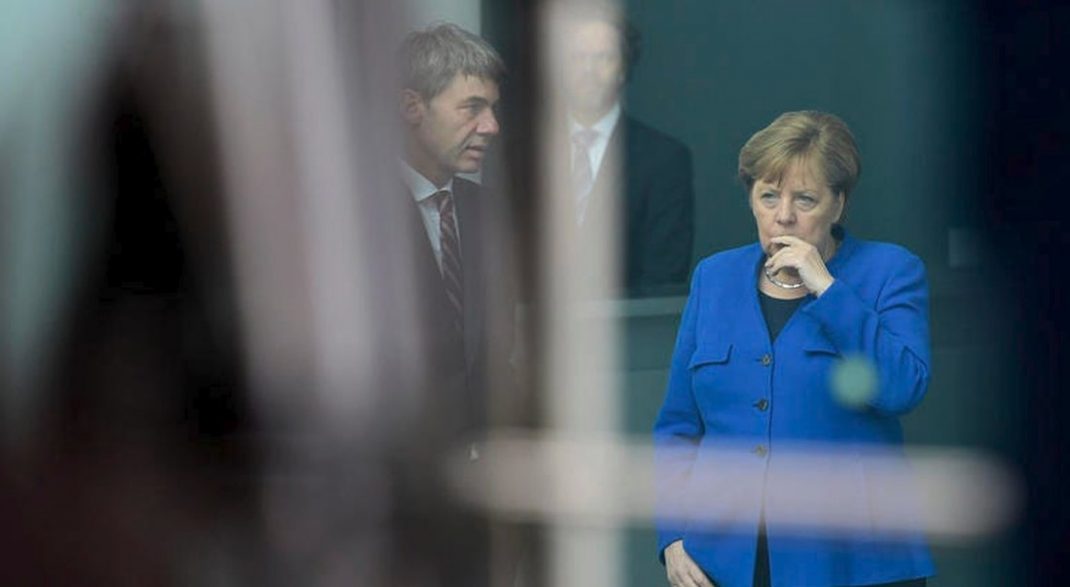By Andreas Kluth
 German Chancellor Angela Merkel can bask in a good news cycle as she steps on the stage at the World Economic Forum in Davos on Thursday.
German Chancellor Angela Merkel can bask in a good news cycle as she steps on the stage at the World Economic Forum in Davos on Thursday.
Earlier this week, she hosted a conference in Berlin to bring about a cease-fire in the Libyan civil war. It ended with glimmers of optimism, padding her well-deserved reputation as possibly the world’s best crisis mediator.
But Merkel also knows she’s about to face an awkward choice.
If her efforts in Libya should succeed, she would have to send German soldiers as part of a European contingent to monitor both the armistice and an embargo on weapons supplied to the warring parties by outside powers such as Russia and Turkey.
Not sending troops after claiming the diplomatic initiative would rob Germany, and the cease-fire, of all credibility.
Sending them would set off a political storm in Germany, where the political consensus and popular opinion are pitted against German participation in military ventures.
Merkel hates this dilemma, and for now is dealing with it in her idiosyncratic way: by deflecting.
In interviews, she has been intoning how premature and inappropriate it would be to think about the second or third step (a deployment) before dealing with the first (the cease-fire).
Coming from a quantum chemist known for thinking many moves ahead, that’s rich. What she’s really saying is that she isn’t ready to talk about this yet.
She knows that Germany’s “strategic restraint,” as former Foreign Minister Guido Westerwelle used to call it, is Janus-faced.
It drives the country’s European and Atlantic allies to distraction; they not only want Germany to spend more on its army, a mediocre fighting force at best, but also to help out more often in legitimate and dangerous missions abroad.
But the same “restraint” also keeps Germany far enough from many conflicts to later claim the role of honest broker, as if it were a large Switzerland.
The Libyan conflict is such a case.
In 2011, Germany was a rotating member of the United Nations Security Council. But when the council voted to intervene in Libya, Germany, along with Russia and China, abstained, leaving its traditional allies, the U.S., the U.K. and France, agape.
When NATO then led an air campaign in Libya that included 19 countries, Germany stayed out.
With hindsight, that refusal may look prudent.
As in Iraq in 2003, it turned out that the Western allies had no plan for the aftermath of their attack and the death of Libya’s dictator. But Germany once again looked like an unreliable confederate.
Moreover, it’s had to endure the consequences.
As Libya turned into a failed state, it became a transit hub for migrants fleeing to Europe. And that, since the refugee crisis of 2015, has been a problem for Merkel in particular.
Merkel also knows that Germany bears much of the blame for the European Union’s failed foreign policy generally.
By refusing to accept hard power in addition to the soft kind as a legitimate tool in the diplomatic kit, Germany often renders itself and the EU impotent, ceding ground to cynical practitioners of realpolitik such as Russia and Turkey, which have already carved up much of Syria between them and would like to do the same with Libya.
Merkel is blessed with an unusual gift.
She lacks the vanity that defines most world leaders today, including the alpha males and prima donnas she hosted at this week’s conference on Libya. With her body language and imperturbable poise, she can defuse tensions better than perhaps any other world leader today.
But if Merkel wants to leave a lasting legacy, she must use her remaining time in office — she has less than two years — to live up to Germany’s international responsibility at last.
That includes reminding Germans, as Frederick the Great once said, that diplomacy without military might is like music without instruments.
In a nation still traumatized by a war it started, that will take courage. But that’s what leadership is about.
Libya may yet become Merkel’s ultimate test.
***
Andreas Kluth – Writer & editor at Bloomberg Opinion. Previously editor-in-chief of Handelsblatt Global. Before that at The Economist for 20 years.
____________
The Washington Post




